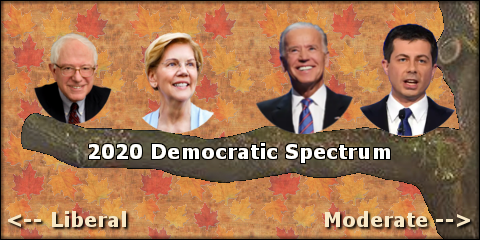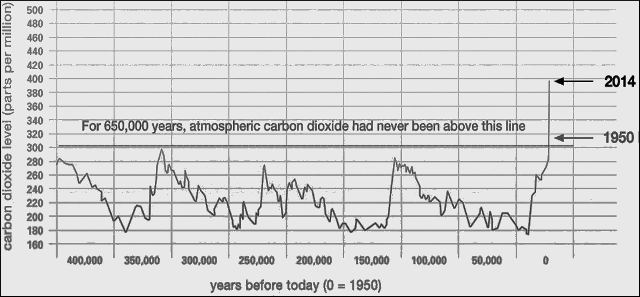~~~ Happenings ~~~
December 16, 2019: The Democratic Dilemma, Part 3
The four leading Democratic candidates:

~~~ The Issues ~~~
III) Climate Change:
Causes of Climate Change
The mechanics of the earth's climate system are simple. When energy from the sun is reflected off the earth and back into space (mostly by clouds and ice), or when the earth's atmosphere releases energy, the planet cools. When the earth absorbs the sun's energy, or when atmospheric gases prevent heat released by the earth from radiating into space (the greenhouse effect), the planet warms. A variety of factors, both natural and human, can influence the earth's climate system.
Natural Causes
As we all know, the earth has gone through warm and cool phases in the past, and long before humans were around. Forces that contribute to climate change include the sun's intensity, volcanic eruptions, and changes in naturally occurring greenhouse gas concentrations. But records indicate that today's climatic warming - particularly the warming since the mid-20th century - is occurring much faster than ever before and can't be explained by natural causes alone. According to NASA, "These natural causes are still in play today, but their influence is too small or they occur too slowly to explain the rapid warming seen in recent decades."
Human Influenced Causes
Humans - specifically, the greenhouse gas emissions we generate - are the leading cause of the earth's rapidly changing climate. Greenhouse gases play an important role in keeping the planet warm enough to inhabit. But the amount of these gases in our atmosphere has skyrocketed in recent decades. According to the Intergovernmental Panel on Climate Change, concentrations of carbon dioxide, methane, and nitrous oxides "have increased to levels unprecedented in at least the last 800,000 years." Indeed, the atmosphere's share of carbon dioxide - the planet's chief climate change contributor - has risen by 40 percent since pre-industrial times.
Natural Resources Defense Council
Ancient air bubbles trapped in ice enable us to step back in time and see what Earth's atmosphere, and climate, were like in the distant past. They tell us that levels of carbon dioxide (CO2) in the atmosphere are higher than they have been at any time in the past 400,000 years. During ice ages, CO2 levels were around 200 parts per million (ppm), and during the warmer interglacial periods, they hovered around 280 ppm (see fluctuations in the graph). In 2013, CO2 levels surpassed 400 ppm for the first time in recorded history. This recent relentless rise in CO2 shows a remarkably constant relationship with fossil-fuel burning, and can be well accounted for based on the simple premise that about 60 percent of fossil-fuel emissions stay in the air.
Climate.Nasa.Gov
Effects from the Global Warming Crisis
- Warming Oceans
- Shrinking Ice Sheets
- Declining Sea Ice
- Sea Level Rise
- Extreme Weather Events
The Progressive Democratic Proposal: The "Green New Deal"
The Green New Deal is a congressional resolution that lays out a grand plan for tackling climate change. Introduced by Representative Alexandria Ocasio-Cortez of New York and Senator Edward J. Markey of Massachusetts, both Democrats. The proposal calls on the federal government to wean the United States from fossil fuels and curb planet-warming greenhouse gas emissions across the economy. It also aims to guarantee new high-paying jobs in clean energy industries.
New York Times 21 Feb., 2019
The Opposition:
Republicans have generally opposed any climate action plan that sets particular emissions targets, and it might run into problems from more moderate Democrats who represent fossil fuel producing areas.
One Republican's Response:
"The Green New Deal, my Democratic colleagues' rallying cry: Killing off entire domestic industries. Winding down millions of jobs. Basically outlawing the only sources of energy that working-class and middle-class families can actually afford."
Senate majority leader Mitch McConnell, 26 March, 2019.
In follow-up tweets to that above the senator used phrases seemingly borrowed from the POTUS' playbook:
The Green New Deal is a... "Socialist Daydream" and "Radical Left-Wing Ideology".
Democratic Candidates Key Climate Proposals:
- Return the United States to the Paris Climate Accord.
- Create new jobs & programs to solve climate crisis.
- 100% clean electricity system with zero emissions.
- Zero emission standards for most new vehicles.
- Investments in conservation and public lands.
- Net-zero emissions from all industries by 2050.
- Cost: $1.5 to $5 trillion over ten years.
President Trump's / Republican Party's Climate Plan
Can you be enthusiastic about having a climate plan when you've gone on record as a climate change denier? It would appear that some Republicans recognize the need to do something.
Representative Matt Gaetz (R-Florida) called his plan, which focuses on solutions like investment in carbon-capture technology, the "Green Real Deal." Senator Lamar Alexander (R-Tennessee) has called for a "new Manhattan Project" for clean energy, proposing large-scale investment in carbon capture, electric vehicles, and green buildings. Senator John Cornyn (R-Texas) has said he would support legislation to combat climate change with "energy innovation."
Pacific Standard Magazine
Today the Environmental Protection Agency [under President Trump] finalized its replacement of [President Obama's] the Clean Power Plan: the Affordable Clean Energy (ACE) rule.
Grist.org, 19 June 2019
Summary of the ACE Proposal:
- Establish guidelines for states to develop emission reduction plans.
- Focus on efficiency improvements at coal plants.
- Plants need only produce fewer emissions per megawatt of electricity.
- Gives aging plants until 2030 to meet stricter standards.
You can see the difference in these proposals and the dilemma facing the Democrats. Their plan calls for the total phase out of fossil fuels as the source for energy production. The Republican plan is far less expensive, while maintaining the status quo of producing energy by burning coal. Whether this can be done more efficiently to affect the alleged climate crisis is the big question.

